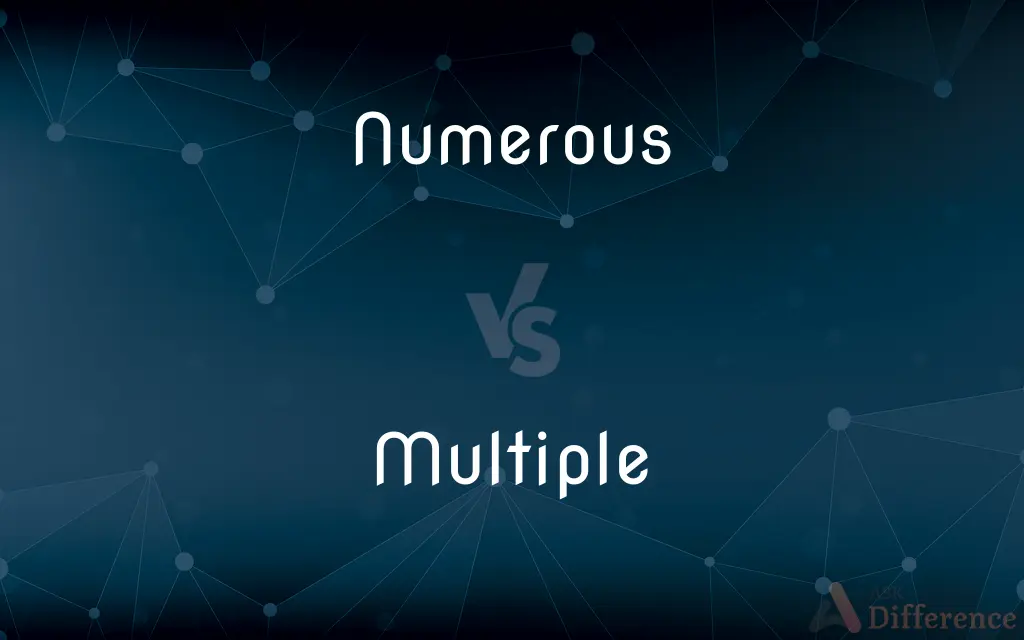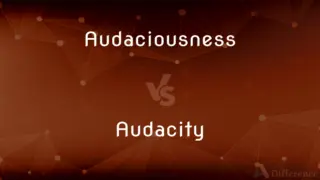Numerous vs. Multiple — What's the Difference?
Edited by Tayyaba Rehman — By Urooj Arif — Updated on March 7, 2024
Numerous implies a large number, while multiple refers to more than one or several.

Difference Between Numerous and Multiple
Table of Contents
ADVERTISEMENT
Key Differences
Numerous is used to indicate a large quantity or a considerable amount of items, people, or instances. It suggests that the count is high enough to be notable but not necessarily specified. On the other hand, multiple refers to the presence of more than one item, person, or instance, often without implying a large quantity. It simply indicates plurality. Saying "there are multiple solutions to this problem" means there are several different ways to solve it, without suggesting that the number of solutions is particularly large.
When describing a situation or a set of items, numerous often carries a connotation of abundance that might be overwhelming or impressive, as in "She received numerous awards for her work." This not only indicates that she received many awards but also adds a layer of admiration for the quantity. In contrast, multiple is more neutral and factual, merely stating the existence of more than one of something, such as "He holds multiple patents." This indicates that he has several patents, without the added connotation of a large or impressive number.
The use of numerous is more suitable when the speaker wants to emphasize the largeness of the quantity, creating an impression of abundance or plenty. It's often used in contexts where the exact number is unknown or irrelevant, but its largeness is noteworthy. Whereas, multiple is appropriate when the speaker wishes to indicate diversity or variety within a group or set, without necessarily emphasizing the quantity. It's useful for pointing out that there are several elements or instances, each potentially different from the others.
In terms of linguistic function, numerous tends to modify nouns that are countable and often plural, underlining the idea of a significant quantity, as in "numerous occasions" or "numerous participants." It helps to create a vivid image of abundance or multitude in the listener's or reader's mind. Multiple, while also modifying countable, plural nouns, emphasizes the existence of more than one, often leading to discussions or considerations about the differences or similarities among the items mentioned, as in "multiple occasions" or "multiple participants," where each instance or participant may bring something unique to the context.
Both terms, though similar in indicating more than one, serve different purposes in communication. Numerous is about quantity, often large, and adds a qualitative aspect to the description, suggesting that the quantity is significant in some way. Multiple is about indicating plurality or variety, without the qualitative aspect of largeness or impressiveness, making it a more neutral term for indicating that there are several of something.
ADVERTISEMENT
Comparison Chart
Definition
Refers to a large number or quantity.
Refers to more than one, several.
Connotation
Implies abundance or a significant amount.
Neutral, indicates plurality without emphasis on quantity.
Usage
Used when emphasizing the largeness of quantity.
Used to indicate diversity or the presence of several elements.
Context
Often used where the exact number is unknown or irrelevant, but its largeness is noteworthy.
Suitable for pointing out the existence of more than one, focusing on diversity or variety.
Examples
"Numerous stars in the sky", "She received numerous awards."
"Multiple solutions to a problem", "He holds multiple patents."
Compare with Definitions
Numerous
Indicating a large quantity or number.
There were numerous options available on the menu.
Multiple
Referring to more than one, several.
The project faced multiple challenges during development.
Numerous
Does not specify an exact number, but implies it is large.
He had made numerous attempts before finally succeeding.
Multiple
Often used to indicate variety or diversity within a set.
The survey revealed multiple perspectives on the issue.
Numerous
Suggests something is occurring often or in many instances.
Numerous studies have confirmed the theory's validity.
Multiple
Neutral in quantity, emphasizing the existence of several.
She explored multiple career paths before finding her passion.
Numerous
Often used to express abundance or plenty.
Numerous fans gathered to watch the game.
Multiple
Can suggest separate or distinct occurrences or items.
The teacher used multiple methods to engage the students.
Numerous
Can imply an overwhelming or impressive quantity.
The museum's collection featured numerous ancient artifacts.
Multiple
Does not necessarily imply a large number.
He discovered multiple errors in the report.
Numerous
Amounting to a large number; many.
Multiple
Having, relating to, or consisting of more than one individual, element, part, or other component; manifold.
Numerous
Indefinitely large numerically, many.
There are numerous definitions of the word 'man'.
Multiple
A number that may be divided by another number with no remainder
4, 6, and 12 are multiples of 2.
Numerous
Consisting of a great number of units or individual objects; being many; as, a numerous army; numerous objections.
Such and so numerous was their chivalry.
Multiple
More than one (followed by plural).
My Swiss Army knife has multiple blades.
Numerous
Consisting of poetic numbers; rhythmical; measured and counted; melodious; musical.
Such prompt eloquenceFlowed from their lips, in prose or numerous verse.
Multiple
Having more than one element, part, component, or function, having more than one instance, occurring more than once, usually contrary to expectations (can be followed by a singular).
Some states do explicitly prohibit multiple citizenship.
It was a multiple pregnancy: the woman had triplets.
Multiple registrations are an increasing problem for many social networking sites.
Numerous
Amounting to a large indefinite number;
Numerous times
The family was numerous
Multiple
(mathematics) A whole number that can be divided by another number with no remainder.
Multiple
(finance) Price-earnings ratio.
Multiple
One of a set of the same thing; a duplicate.
Multiple
A single individual who has multiple personalities.
Multiple
One of a set of siblings produced by a multiple birth.
Multiple
A chain store.
Multiple
A discovery resulting from the work of many people throughout history, not merely the work of the person who makes the final connection.
Multiple
More than one piercing in a single ear.
Multiple
Containing more than once, or more than one; consisting of more than one; manifold; repeated many times; having several, or many, parts.
Multiple
A quantity containing another quantity an integral number of times without a remainder.
Multiple
The product of a quantity by an integer;
36 is a multiple of 9
Common Curiosities
Can "multiple" imply a large quantity?
"Multiple" indicates several or more than one, but it does not inherently imply a large quantity; it is more neutral regarding the number.
Can "numerous" and "multiple" be used interchangeably?
While they both indicate more than one, they differ in connotation; "numerous" implies a large quantity, while "multiple" is neutral and focuses on plurality.
When is it appropriate to use "multiple"?
"Multiple" is appropriate when indicating the existence of several elements or instances, especially to highlight diversity or variety.
How does "multiple" convey diversity?
"Multiple" conveys diversity by indicating the presence of various distinct elements or categories within a group, without focusing on the quantity.
What does "numerous" imply?
Numerous implies a large number or quantity, often suggesting abundance or plenty.
How do "numerous" and "multiple" affect the tone of a statement?
"Numerous" can add a tone of impressiveness or overwhelm due to its connotation of abundance, while "multiple" maintains a neutral tone by simply indicating plurality.
When should I use "numerous"?
Use "numerous" when you want to emphasize the largeness of a quantity or the abundance of something.
How does "multiple" differ from "numerous"?
Multiple refers to more than one or several, without necessarily implying a large quantity, focusing on plurality or diversity.
Is "numerous" always indicative of a large number?
Yes, "numerous" is typically used to suggest a considerable amount or abundance, though the exact number is not specified.
What context is best for using "numerous"?
Use "numerous" when the context requires highlighting a significant quantity, especially when the exact count is less important than the impression of abundance.
What is the effect of using "numerous" in descriptive writing?
In descriptive writing, "numerous" adds a sense of scale and abundance, enriching the narrative with the impression of plentifulness.
Can "numerous" and "multiple" be used in scientific writing?
Yes, both can be used in scientific writing: "numerous" for emphasizing significant quantities and "multiple" for indicating the presence of several factors or variables.
Can "numerous" be used for non-countable nouns?
Typically, "numerous" is used with countable nouns to denote a large number of countable items or instances.
Does "multiple" imply any numerical value?
"Multiple" implies more than one but does not specify any particular numerical value, leaving the exact count open.
Is "multiple" suitable for describing large quantities?
While "multiple" can be used to describe several items, it doesn't inherently convey a large quantity like "numerous" does.
Share Your Discovery

Previous Comparison
Constructive vs. Productive
Next Comparison
Audaciousness vs. AudacityAuthor Spotlight
Written by
Urooj ArifUrooj is a skilled content writer at Ask Difference, known for her exceptional ability to simplify complex topics into engaging and informative content. With a passion for research and a flair for clear, concise writing, she consistently delivers articles that resonate with our diverse audience.
Edited by
Tayyaba RehmanTayyaba Rehman is a distinguished writer, currently serving as a primary contributor to askdifference.com. As a researcher in semantics and etymology, Tayyaba's passion for the complexity of languages and their distinctions has found a perfect home on the platform. Tayyaba delves into the intricacies of language, distinguishing between commonly confused words and phrases, thereby providing clarity for readers worldwide.
















































